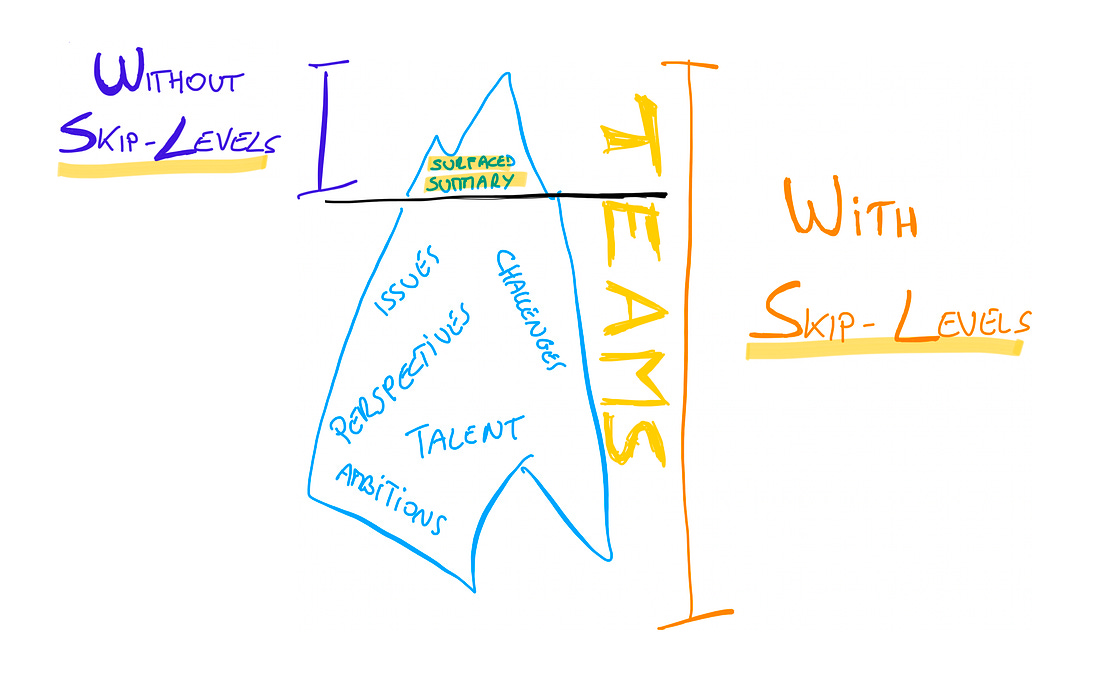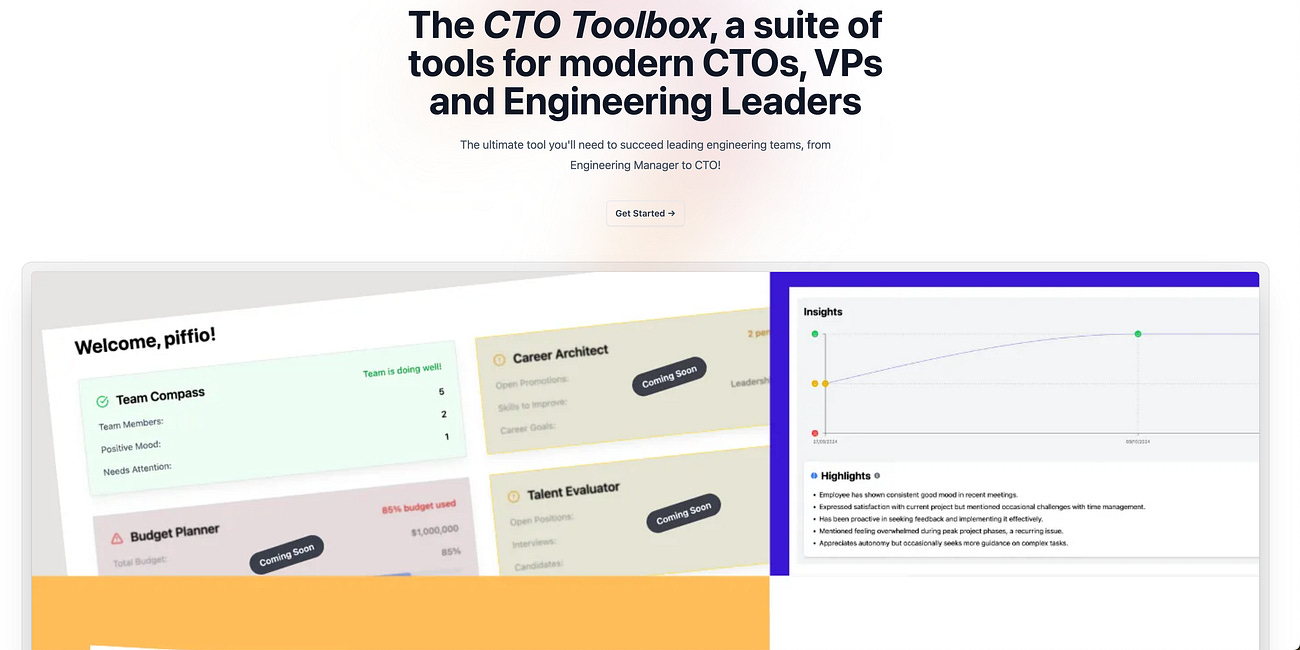Skip Level Meetings Are About Insight, Not Distrust
- Sergio Visinoni from Sudo Make Me a CTO <makemeacto@substack.com>
- Hidden Recipient <hidden@emailshot.io>
Hi, 👋 Sergio here! Welcome to another free post from the Sudo Make Me a CTO newsletter. If you prefer to read this post online, just click the article title. As this is a free newsletter, I do immensely appreciate likes, shares and comments. That's what helps other readers discover it! Skip Level Meetings Are About Insight, Not DistrustHow to gain unfiltered perspectives and build trust without undermining your managersYou're leading one or more engineering teams. Maybe you just inherited a new team, like a client I spoke with recently. He struggled with a classic leadership dilemma: "Do I talk directly to the engineers reporting to my new manager, or do I only go through him to signal trust and support?". It’s tempting to respect the chain of command to avoid stepping on toes. Let your managers do their jobs without getting in the way. You clearly want to empower your managers and don't want to set the example of someone who micromanages or bypasses them. The problem is that you're flying half-blind if you only talk to your direct reports. You're missing the ground truth. And you're missing great opportunities for leading and inspiring people who don't directly report to you. I've made that mistake more than I'd like to admit, so I didn't hesitate to suggest my client establish semi-regular skip level 1-to-1s with people in the team they had just inherited. Skip levels are a powerful tool that, when deployed carefully, can make the overall organization more effective. Why You Need to Be Doing Skip-LevelsI believe skip level should be part of any leader's standard toolkit as soon as they inherit or establish a team with a layer of management between them and the individual contributors on the ground. There are many reasons why I believe so. Let's explore them one by one.
Okay, But What About the Risk of Undermining My Manager?In my experience, this is the #1 reason leaders shy away from skip levels. And it's a valid concern. You should always support and empower people reporting to you. If done poorly, you can dramatically disempower your managers and create chaos. The solution isn't avoidance; it's doing them correctly. Let's start with something foundational: you have the right to speak with absolutely anyone in your organization, regardless of who they report to. As a leader, you have the duty to do whatever it's in your power to ensure the organization as a whole is set up for success. That, to me, has two straightforward implications. First, if someone argues you don't have the right to go and talk with someone in their team, that's their problem. They might lack confidence or have something to hide. Don't let it get in the way of exercising something genuinely at the intersection of your rights and duties. At the same time, work with them to understand where the problem is coming from and help them overcome it. Just don't let it stop you from establishing those conversations. Secondly, talking to someone should not be implicitly interpreted as stealing their attention or changing their priorities. You must be careful not to fall into the temptation of sidestepping your direct reports by directly instructing their people on what they should do, how, and when. That would be a disaster that would disempower your managers and undermine your credibility with the whole organization. Think about how skip levels can contribute to implementing an approach of inspected trust² across your organization. You should probably start by inviting your manager to have skip levels with your direct reports. That said, here are some simple rules I recommend you follow to maximize positive impact and minimize side effects.
Inherited a New Team? Start skip-levels earlyFor my client inheriting that new team? Skip-levels are non-negotiable. It's the fastest way to get to know the full context, mapping out the team's different people, talents, and personalities. They help you quickly get a sense of the team's health, whether there are major interpersonal issues among its members or tensions and frustrations with the team's manager. As the team's manager is likely also newly reporting to you, spend the required time to build that rapport, explaining how you usually work with your teams and why you believe skip levels are an essential part of it. But don't fall for the temptation of delaying the moment you start practicing them, as you'd like to let things settle first. Instead, get started quickly and respectfully. Schedule those meetings. Talk to your team's team. Be brave, respectful, and delicate enough to seek the ground truth. You, your managers, and your entire organization will be better off thanks to your taking action. If you enjoyed thisThis newsletter is free, and I intend to keep it free forever. Sharing it with others helps immensely in growing it. Engaging with my professional services is a great way to ensure I can continue dedicating many hours each week to producing what I hope to be high-quality content. Those services articulate around three legs:
If your needs fall into a different category, such as newsletter collaborations or sponsoring, please reply to this email or schedule a free call via this link. 🗣️ Feedback requiredAs you might have read in a prior article, I'm conducting early user testing on a SaaS product I'm building to help Engineering Leaders in their daily work. Please join the waitlist if you'd like to test it for free and contribute to shaping the tool. You can find more details in this article, including the link to sign up for the waitlist. 1 Rashomon is one of the masterpieces of the Japanese director Akira Kurosawa. It tells the story of a crime and the challenging attempts to establish the truth of the events. It is a classic movie everyone should watch at least once in their life. Find out more on the movie's Wikipedia page. 2 Will Larson often discusses Trust per se not being a management technique and advocates for a sort of trust and verification he calls “inspected trust.” Read more about it in this article. Sudo Make Me a CTO is a free newsletter edited by Sergio Visinoni. If you found this post insightful, please share it with your network using the link below. If you or your company need help with one of the topics I talk about in my newsletter, feel free to visit my website where you can schedule a free 30 minutes discovery call. I'd be delighted to investigate opportunities for collaboration! |
Similar newsletters
There are other similar shared emails that you might be interested in:

